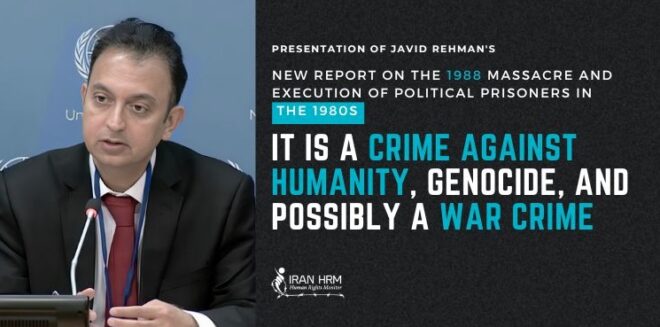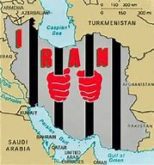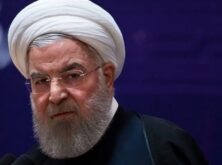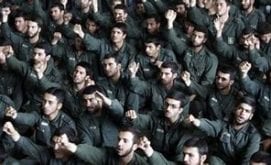iran-hrm – It is a crime against humanity, genocide, and possibly a war crime
Iran Human Rights Monitor (Iran HRM) presents a report on the conference titled “Examining the Ongoing Crimes against Humanity by the Iranian Regime” featuring Prof. Javaid Rehman, the UN Special Rapporteur for Iran. This conference, initiated by the Justice for the Victims of the 1988 Massacre in Iran Association, took place in Geneva on Thursday, June 19, 2024. During the conference, Prof. Javaid Rehman presented his latest report on the 1988 massacre and executions carried out by the regime of the Mullahs in 1981 and 1982. This report will soon be published by the United Nations.
Professor Javaid Rehman’s Special Report on the Human Rights Situation in Iran is an important achievement as he has compiled the report detailing the heinous crimes and gross violations of human rights in Iran from 1981 to the 1988 massacre. This report provides comprehensive details on the subject matter.
In the past six months, I have been focused on
writing this report. I began the report with two quotes. One of them is
from Montazeri, who stated that this is the greatest crime in the
history of the Islamic Republic, which will condemn our world, and the
world will register you as criminals. This is very significant because
Montazeri was the designated successor to Khomeini at that time, and he
had insight into these crimes. The extent of the crimes became evident
through Montazeri’s statement.
The second quote is from myself, where
I stated that the death of Ebrahim Raisi on May 19, 2024, should not
lead to the denial of achieving truth, justice, and accountability for
the people of Iran. Raisi was a member of the Death Commission that
committed crimes against humanity, including the massacre and arbitrary
mass executions of thousands of political prisoners in 1988. Those who
committed crimes against humanity in the 1980s and beyond must be held
accountable, and impunity within the Islamic Republic of Iran must come
to an end.
In my report, I emphasize the need for accountability due to the crimes against humanity and genocide that have taken place. This idea is the overarching theme of my report. This report is important because it directly affects the lives of people today. The survivors and victims continue to suffer, and the memory of those crimes persists. They have endured immense psychological and emotional pain. In many cases, the families of the forcibly disappeared individuals have been actively seeking their loved ones, while the authorities of the regime have violated their rights. They demand justice and accountability from the United Nations and its members.
There are other important points that demonstrate why the events of the 1980s and 1988 are relevant to the present day.
The uprising in 2022 was not the beginning of the struggle for human rights and women’s rights. It started when Khomeini came to power and imposed restrictions, including the enforcement of compulsory hijab. So, we need to consider what transpired in the 1960s.
The accusations of heresy and waging war against God, which the regime utilizes, trace back to the 1980s. The judicial system, courts, and laws of this regime can be traced back to the 1980s. For this reason, when we discuss the crimes of the 1980s, we must understand that they are connected to the issues of today.
Prof. Javaid Rehman said he had investigated horrific crimes, which were examples of crimes against humanity, genocide, and possibly war crimes. He said the crimes involved murder, destruction, torture, sexual assault, and similar acts against different populations. The issue of enforced disappearances was also crucial, he noted.
He pointed out that he had extensively researched all of these crimes. The key point of what happened in 1988 was that thousands of political prisoners were targeted and executed. They did not have fair trials. Khomeini issued a fatwa and declared that all “hypocrites,” a term he used to refer to those opposing his regime, should be eliminated.
He also instructed the mentioned commissions not to show any mercy and disregard human rights. He said those commissions could not be considered “legal” under any circumstances.
This was a fundamental plan on which the execution orders were based, Mr. Rehman emphasized. Many of those prisoners had not committed any crimes. Many of them were arrested for activities such as distributing brochures. Therefore, the actions of the Death Commissions were not to enforce the law but to simply execute those individuals. They were tasked with determining whether they were “loyal” or not. Thousands of people were executed.
These prisoners were punished for their ideological and political positions. Torture was also carried out.
This was not a legitimate court. They could not question the decisions of the commissions. Executions were carried out very quickly. They were asked questions that were not legal, such as whether they were betraying the Mujahideen or if they would assist in the execution of their fellow inmates. These were not legal questions. The sole responsibility of these commissions was to determine whether these individuals, according to their ideological standpoint, were abandoning their positions or not.
The plan was to rid themselves of these political opponents.
In another wave of executions in August of that year, the commission targeted Marxists and executed a significantly smaller number of them. After that, everything was done in secrecy. No information was provided about the actions taken against these political prisoners, and their families remained uninformed. They were buried in mass graves. When families sought information, they either received no response or faced suppression, being told, “These individuals have gone to hell!” The families suffered ongoing harassment, which continues to this day. One of the main concerns I have emphasized is that the crimes against humanity still continue to affect thousands of families, survivors, and their loved ones because they still do not know what has happened to them. The cause of death has never been explained. Families have been tortured and pressured to refrain from pursuing the matter. They have been told, for example, to say that their loved ones died at home! They are still seeking the truth.
Prof. Javaid Rehman concluded his remarks by appealing to the international community to take concrete actions and establish an accountability mechanism that preserves all the evidence gathered by him, and accordingly take actions in terms of accountability and immunity of the Iranian regime leaders.
He also emphasized the importance of involving survivors and witnesses in this case. Prof. Rehman pointed out that the Iranian regime was making every effort to destroy the mass graves and cover up the truth, while truth had to be revealed and families informed of what happened to their loved ones.
The other speakers in this session were:
Professor Wolfgang Schomburg: Former Judge of the International Criminal Tribunal for the former Yugoslavia (2001-2008).
Tahar
Boumedra: Former Representative of the United Nations High Commissioner
for Human Rights in Iraq and Head of the Justice for the Victims of the
1988 Massacre in Iran Association.
Dr. Grazyna Baranowska: Member of
the United Nations Working Group on Enforced or Involuntary
Disappearances, who sent a video message to this session.
 Shabtabnews In this dark night, I have lost my way – Arise from a corner, oh you the star of guidance.
Shabtabnews In this dark night, I have lost my way – Arise from a corner, oh you the star of guidance.



